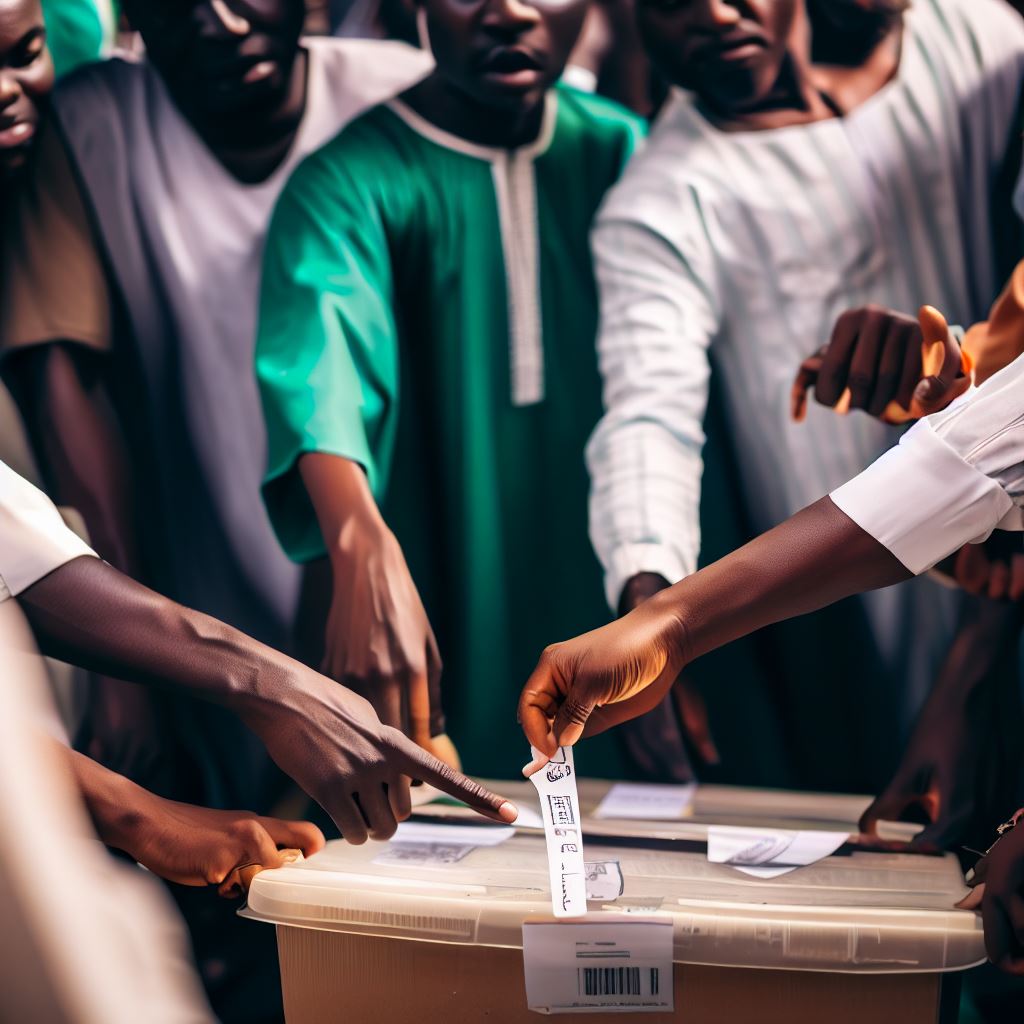Democracy in Nigeria: The Role of Politicians
Last Updated on January 26, 2024
Introduction
Democracy refers to a system of governance in which power is vested in the people.
It is crucial for Nigeria to embrace democracy as it promotes citizen participation and accountability.
The purpose of this blog post is to explore the role of politicians in Nigeria’s democratic system.
A. The Definition of Democracy
Democracy is characterized by the principles of equality, freedom, and fair representation.
It allows citizens to have a say in decision-making and safeguards their fundamental rights.
B. The Importance of Democracy in Nigeria
Democracy plays a vital role in Nigeria by ensuring political stability and economic development.
It allows for peaceful transitions of power and encourages the participation of different ethnic and social groups.
C. Purpose of the Blog Post
The purpose of this blog post is to shed light on the responsibilities and impact of politicians in a democracy.
It aims to analyze the challenges and opportunities faced by politicians in promoting democratic values.
Politicians are key players in Nigeria’s democratic process. Their roles include representing the interests of citizens, formulating policies, and executing government programs.
However, the actions of politicians can either strengthen or weaken democracy in Nigeria. Politicians must prioritize the welfare of the people and fulfill their electoral promises.
They should promote transparency, accountability, and good governance to build trust and confidence in the system.
Furthermore, politicians must listen to the concerns and aspirations of the citizens they serve. They should involve the public in decision-making and ensure the inclusion of marginalized groups.
To enhance democracy, politicians should uphold ethical standards and condemn corruption. They must act as servants of the people, not agents of personal gain or self-interest.
Essentially, politicians in Nigeria have a crucial role to play in the functioning of democracy.
Their commitment to democratic values and the well-being of the Nigerian people is paramount for a thriving nation.
Background on Democracy in Nigeria
A. Historical perspective on democracy in Nigeria
- Nigeria gained independence from British colonial rule in 1960.
- Initially, a parliamentary system was adopted, but it was soon replaced by military rule.
- The first democratic elections were held in 1979, marking a return to civilian government.
B. Challenges faced in establishing a democratic system
- Political instability and frequent military coups hindered the growth of democracy.
- Ethnic and religious divisions created tension and hindered the formation of a united democracy.
- Corruption and lack of transparent governance posed significant challenges to democratic practices.
C. Progress and setbacks in Nigerian democracy over the years
- Democracy has had its share of setbacks through military interventions, causing disruptions.
- The annulment of the 1993 presidential election by the military was a major setback.
- However, Nigeria has made progress with uninterrupted civilian rule since 1999.
- Free and fair elections have been conducted, enhancing the democratic process.
- There is increased accountability and governance transparency, although corruption remains a challenge.
- Citizen participation in politics and activism has grown, promoting democratic ideals.
Read: Corruption in Politics: A Nigerian Perspective
Role of Politicians in Nigerian Democracy
A. Definition of a politician
In Nigerian democracy, a politician is an individual who holds a political office or seeks one, working towards achieving political goals through participation in the democratic process.
B. Responsibilities of politicians in a democratic system
- Representation of the public’s interests: Politicians have the crucial role of being the voice of the people they represent, advocating for their concerns, needs, and aspirations.
- Policy formulation and implementation: It is the duty of politicians to develop policies that address societal issues and effectively implement them to bring about positive change.
- Ensuring transparency and accountability: Politicians must promote transparency by providing information to the public, while being accountable for their decisions and actions to maintain public trust.
C. Influence of politicians on the democratic process
Politicians play a significant role in shaping and impacting the Nigerian democratic process in various ways:
- Political campaigns and elections: Politicians actively engage in campaigns, mobilizing voters and competing for elected positions.
- Legislative decision-making: Politicians participate in legislative bodies, shaping laws and policies through debates, negotiations, and voting.
- Public policy influence: Politicians drive the policy agenda, propose bills, and advocate for the adoption or amendment of specific policies.
- Executive branch influence: Politicians who hold executive positions have the power to implement policies and carry out government functions.
- Oversight and checks on government: Politicians serve as checks and balances on government actions, ensuring they are in line with democratic principles and citizens’ interests.
- Constituency representation: Politicians act as intermediaries between their constituents and the government, addressing the concerns and needs of their local communities.
- Public opinion and advocacy: Politicians possess a platform to amplify public opinions, advocate for social justice, and champion causes on behalf of the people.
In fact, politicians in Nigerian democracy hold great responsibility in representing the public’s interests, formulating and implementing policies, as well as ensuring transparency and accountability.
Their influence on the democratic process is substantial, shaping legislation, government actions, and public opinion.
By fulfilling their duties diligently, politicians can contribute to the continued growth and development of democracy in Nigeria.
Read: From Local to National: Political Offices in Nigeria
Challenges Faced by Nigerian Politicians
A. Corruption and embezzlement of public funds
- Nigerian politicians often engage in corrupt practices by misappropriating public funds.
- Embezzlement of public funds is a major challenge faced by politicians in Nigeria.
- Corruption undermines democracy and leads to a loss of trust in government.
- Politicians who engage in corruption not only betray the public but also hinder development.
B. Involvement in electoral malpractices
- Nigerian politicians sometimes resort to electoral malpractices to gain an unfair advantage.
- Electoral malpractices such as voter intimidation and rigging undermine the democratic process.
- Politicians involved in electoral malpractices subvert the will of the people.
- These malpractices erode public confidence in the electoral system and impact the credibility of politicians.
C. Lack of accountability and transparency
- Nigerian politicians often lack accountability and transparency in their actions and decision-making.
- The absence of accountability allows politicians to act without consequences.
- Lack of transparency makes it difficult for citizens to track the actions of politicians.
- The lack of accountability and transparency hinders the progress of democracy in Nigeria.
D. Tribal and ethnic politics
- Nigerian politicians frequently exploit tribal and ethnic divisions for political gain.
- Tribal and ethnic politics promote division and hinder national unity.
- Politicians use identity politics to manipulate voters and consolidate their power.
- Tribal and ethnic politics undermine meritocracy and breed inequality among politicians.
E. Influence of money and financial interests
- Nigerian politicians often succumb to the influence of money and financial interests.
- Financial interests can compromise politicians’ integrity and decision-making.
- The influence of money in politics perpetuates inequality and favors the wealthy.
- Politicians should prioritize the needs of the people over financial gain for a healthy democracy.
In short, Nigerian politicians face several challenges that impact the quality of democracy in the country.
Corruption and embezzlement of public funds undermine public trust, while involvement in electoral malpractices subverts the will of the people.
The lack of accountability, transparency, and the influence of tribal/ethnic politics hinder the progress of democracy.
Additionally, the influence of money and financial interests compromises politicians’ integrity.
Addressing these challenges is crucial for strengthening democracy in Nigeria and ensuring that politicians fulfill their role in serving the people.
Read: The Political Economy: Nigeria’s Leaders and Policies

Impact of Politicians on Nigerian Democracy
Politicians in Nigeria have a significant impact on the country’s democracy and its various dimensions.
In this section, we will explore how politicians influence democratic institutions, citizens’ participation in governance, the rule of law, and economic development.
A. Strengthening or weakening democratic institutions
Democratic institutions are the backbone of any functioning democracy. Politicians hold the responsibility to strengthen these institutions through their commitment to democratic values and principles.
By supporting and enhancing the effectiveness of institutions such as the judiciary, electoral bodies, and legislative bodies, politicians can consolidate democracy in Nigeria.
However, politicians also have the capacity to weaken democratic institutions. This can occur through acts of corruption, nepotism, and interference in the functions of these institutions.
When politicians exploit their power for personal gain or manipulate the system to remain in office indefinitely, democratic institutions suffer and lose credibility.
B. Enhancing or suppressing citizens’ participation in governance
Citizens’ participation is vital for a thriving democracy. Politicians have the responsibility to encourage and facilitate citizen engagement in the governance process.
They should create platforms for citizens to express their opinions, hold town hall meetings, and listen to the concerns and aspirations of the people they represent.
On the other hand, politicians can also suppress citizens’ participation to consolidate their power.
They may employ tactics such as intimidation, restrictions on freedom of speech and assembly, and voter suppression to silence dissenting voices and maintain control.
C. Promoting or undermining the rule of law
The rule of law is essential for a functional democracy.
Politicians play a crucial role in upholding and promoting the rule of law by respecting and abiding by legal frameworks, supporting an independent judiciary, and fighting against corruption.
However, politicians can also undermine the rule of law when they engage in corrupt practices, manipulate the judiciary for their own benefit, or fail to address issues of human rights violations and injustice.
Such actions erode public trust in the rule of law and weaken democracy.
D. Fostering or obstructing economic development
Politicians possess the power to shape economic policies and initiatives that can either foster or obstruct economic development.
Through sound economic planning, transparent governance, and investment in key sectors, politicians can drive economic growth and improve the living standards of Nigerians.
However, politicians may also obstruct economic development through corruption, mismanagement of resources, and favoring personal interests over the welfare of the nation.
Such practices hinder progress and perpetuate inequality.
In general, politicians in Nigeria hold immense influence over the state of democracy in the country.
They can either strengthen or weaken democratic institutions, enhance or suppress citizens’ participation, promote or undermine the rule of law, and foster or obstruct economic development.
It is crucial for politicians to prioritize the welfare of the nation and act in the best interest of the people to ensure a vibrant and inclusive democracy in Nigeria.
Read: Youth in Nigerian Politics: A New Era of Leadership
Uncover the Details: Nigeria’s Special Police Units: A Comprehensive Overview
Solutions to Enhance the Role of Politicians in Nigerian Democracy
A. Strengthening anti-corruption efforts and ensuring accountability
- Implement strict measures to combat corruption in all aspects of governance.
- Establish independent anti-corruption agencies with the power to investigate and prosecute corrupt politicians.
- Create a transparent system for tracking the flow of public funds and holding politicians accountable.
- Encourage the public to report cases of corruption and protect whistleblowers.
- Provide appropriate punishments for politicians found guilty of corruption to deter others.
B. Electoral reforms to minimize malpractices and enhance transparency
- Introduce electronic voting systems to reduce the possibilities of rigging and manipulation.
- Enhance the independence of the electoral commission to ensure fair and credible elections.
- Strengthen laws against electoral malpractices, such as voter intimidation and ballot stuffing.
- Promote the use of biometrics for voter identification to prevent multiple voting.
- Increase transparency in campaign financing and make it mandatory for politicians to disclose their sources of funding.
C. Encouraging the inclusion of diverse voices and reducing tribal politics
- Promote political parties that embrace diversity and discourage ethnic-based parties.
- Implement policies to encourage the representation of marginalized groups in politics.
- Encourage dialogue and cooperation among politicians from different ethnic and religious backgrounds.
- Foment civic and national pride to discourage politicians from exploiting tribal sentiments.
- Promote the understanding that unity and inclusivity are vital for Nigeria’s progress.
D. Promoting education and ethical leadership among politicians
- Establish training programs for aspiring politicians to develop their leadership and governance skills.
- Emphasize the importance of ethics and integrity in political leadership during training.
- Encourage politicians to continually update their knowledge about governance and public policy.
- Provide platforms for politicians to engage in constructive debate and exchange of ideas.
- Highlight the positive impact of ethical leadership through success stories and case studies.
E. Engaging citizens in the democratic process through awareness campaigns and active participation
- Conduct civic education programs to educate citizens about their rights, responsibilities, and the importance of voting.
- Utilize social media and other communication channels to disseminate information about the democratic process.
- Organize town hall meetings and public forums for citizens to interact with politicians and discuss important issues.
- Encourage political debates and a culture of robust political discourse to foster an informed electorate.
- Develop mechanisms that enable citizens to participate actively in decision-making processes at local and national levels.
By implementing these solutions, Nigeria can enhance the role of politicians in its democracy and build a more inclusive and accountable political system.
It requires concerted efforts from all stakeholders, including politicians, citizens, civil society organizations, and the government, to bring about meaningful change.
Only by working together can Nigeria overcome the challenges it faces and establish a thriving democracy that fulfills the aspirations of its citizens.
Conclusion
Democracy is crucial for Nigeria’s development and the well-being of its citizens.
Politicians play a pivotal role in maintaining a healthy democratic system.
It is the responsibility of citizens to hold politicians accountable and actively engage in politics.


